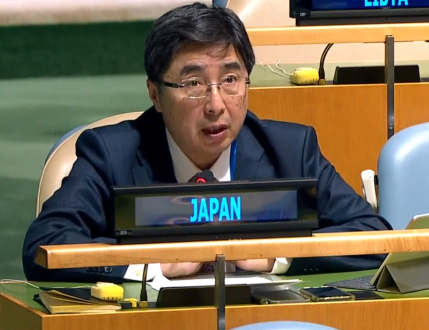コモン・アジェンダに関するテーマ協議第五回会合における石兼大使ステートメント
令和4年3月10日

(As delivered)
Mr. Vice-President,
Mr. Secretary-General,
Let me start by commending you on successfully holding the consultations, which conclude with today’s theme “enhancing international cooperation.” To my deep regret, what we witness today in Ukraine is the exact opposite of this. We call on Russia to heed the overwhelming voice of the international community.
I have two points to make on the proposals in this final cluster.
First, regarding the proposed “Summit of the Future.” The dire situation in Ukraine must have been beyond the imagination of the OCA report’s author. I believe no delegation had imagined it during the negotiation of the 75th Anniversary Declaration. The raison d’être of the UN is at stake. Beyond the unbearable suffering of the Ukrainian people, there will be profound lasting impacts on international peace and security, on global economy, on sustainable development and on human security everywhere.
Are we to hold a “Summit of the Future” as proposed, focusing on areas “where governance arrangements are nascent or require updating,” such as digital technology, outer space, future generations, etc.? Or should we discuss about something much broader? Shouldn’t we use the Summit to review our efforts to build back better, not only from the pandemic but also from still uncertain global economic impacts of the crisis in Ukraine and from the dysfunctions of our system including that of Security Council and rebuild our solidarity? Meanwhile, we should not be overly ambitious in seeking agreements on governance arrangements in critical areas, being dealt with in other fora with more expertise.
Second, on partnerships. The UN alone cannot address effectively the multifaceted challenges faced by humans, nations and the planet. Japan therefore welcomes the UN’s engagement with regional organizations, IFIs, parliaments, sub-national governments, private sector and civil society. That said, multi-stakeholder partnerships can and should be strengthened without adding new structures or layers. Existing frameworks for partnerships should be streamlined to deliver coherent messages and enhance cooperation beyond fragmented exchanges. This can be done, if there is a will and leadership.
Most importantly, institutional reforms should strengthen bottom-up processes to capture the voices of people most in need and deliver solutions to countries, communities and people. Without such effort to link the UN closer to people, the preambular paragraphs and Article 1 of the Charter sound hollow.
To conclude, let me reassure you of Japan’s continued engagement in the OCA report follow-up, including the preparation of future summits.
Thank you.
